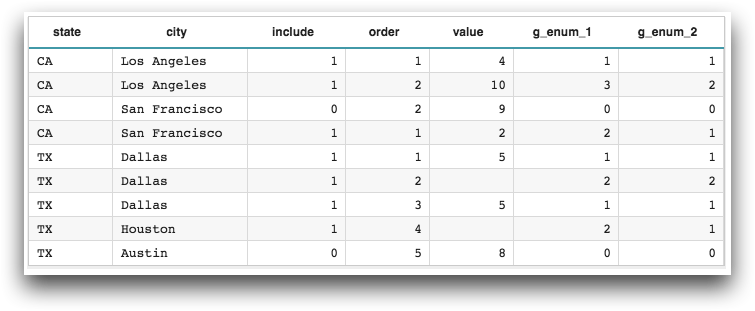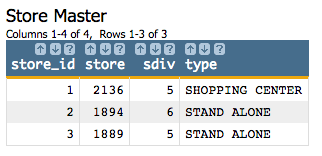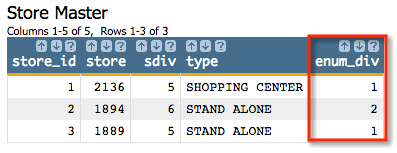g_enum(G;S;O;X)
Returns the enumeration of unique values across one or more columns within a given group.
Function type
Vector only
Syntax
g_enum(G;S;O;X)
t_enum(X)Input
| Argument | Type | Description |
|---|---|---|
G |
any | A space- or comma-separated list of column names Rows are in the same group
if their values for all of the columns listed in If If any of the columns listed in |
S |
integer | The name of a column in which every row evaluates to a 1 or 0, which determines
whether or not that row is selected to be included in the calculation If
If any of the values in
|
O |
integer | A space- or comma-separated list of column names that
determine the row order within a particular group If
If any of the values in |
X |
any simple type | A space- or
comma-separated list of column names If more than one column is specified, the function enumerates the unique combination of values across all of the columns specified. |
Return Value
For every row in each group defined by G (and for those rows where
S=1, if specified), g_enum
returns an integer value corresponding to the enumeration of that row. Each unique value in
X is assigned a number, beginning with 1 and
increasing by 1 each time a new unique value is encountered. Repeated values are assigned
the same number. The order of the values is determined by the values in O;
if O is omitted, the order is the current display order of the table.
For those rows where S=0, the result is
0.
Sample Usage
<base table="pub.doc.samples.ref.func.g_func_time_series_sample_usage"/> <willbe name="g_enum_1" value="g_enum(state;include;order;value)"/> <willbe name="g_enum_2" value="g_enum(state city;include;order;value)"/>

Example
Let's take a look at g_enum(G;S;O;X) in action. We'll use the
Store Master table (pub.demo.retail.store) to
demonstrate the use of this function. When we open the table, it looks something like
this:

<colord:<colord hide="addr,city,state,zip,sqft"/>So now our table looks like this:

Let's say we want to enumerate all of the unique divisions for all of the stores in our
table. Since we want to do the enumeration for the entire table, we'll omit the
G parameter. We'll omit the S parameter since we want
all of the rows to be considered by the function and not just a subset, and we'll omit the
O parameter since we're not particularly concerned about the ordering for
this example. For the X parameter, we'll specify the sdiv
column since we want to enumerate the unique divisions.
<willbe name="enum_div" value="g_enum(;;;sdiv)"/>This will give us a column that looks like the following:

We can see that the two rows where the division is 5 have been enumerated with the value 1, and the one row with division 6 has been given the value 2.
type column
instead:<willbe name="enum_type" value="g_enum(;;;type)"/>We get the following results:

Now we see that the row with type "SHOPPING CENTER" has been given the enumerated value 1, and the two rows with type "STAND ALONE" have the value 2.
X in
g_enum(G;S;O;X), so we could specify both the sdiv and
type
columns:<willbe name="enum_div_type" value="g_enum(;;;sdiv type)"/>
Now we see that each unique combination of sdiv and type
has been given a unique enumeration.
Additional Information
- The
t_version of this function defaults theGargument and omits theSargument. The default forGis set at table load time based on the organization of the table.
